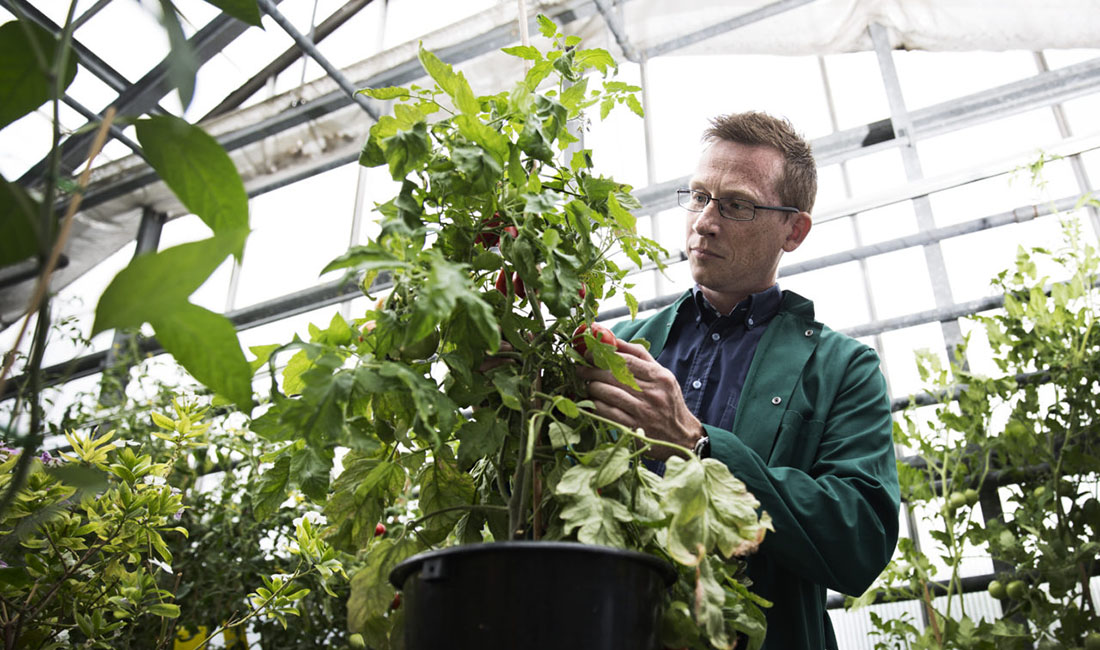Plant Nutrients and Food Quality

Food quality is a complex trait covering a wide array of characteristics including nutrient content and bioavailability, protein level, amino acid composition and the presence of potentially toxic compounds such as heavy metals. We develop analytical methods that enable us to investigate key factors controlling the quality of plant based food and feed. Our goal is to provide new knowledge and recommendations regarding sustainable and resource efficient plant production that simultaneously delivers safe, authentic and nutritious food.
- Theme 1 - Food quality
Our studies on food quality embrace research activities from farm to fork. We investigate the impacts of management practice and fertilization strategy on the nutritional value of plant-based foods from various plant production systems. This includes organic and conventional agriculture as well as urban farming systems. We conduct studies at field scale, in greenhouses/climate chambers and collaborate with companies specialized in hydroponics and aeroponics.
Food authentication is a major focus point within our food quality activities and it represents a rapidly growing discipline both nationally and internationally. We have developed analytical methods for authenticating the geographical and agricultural origin of a variety of plant products and have documented systematic differences in the isotope signatures of organic versus conventional crops. We currently investigate the underlying biological mechanisms controlling these differences and collaborate with industry partners and authorities on implementation of our methods. - Theme 2 - Plant nutritional aspects of food quality
We aim to understand fundamental biochemical and plant nutritional processes and pathways influencing the quality of plant-based food and feed. We study key factors controlling the nutritional status of plants including soil fertility, agricultural management practices and fertilization rate and type.
We seek to develop and utilize novel analytical methods for investigating nutrient availability and utilization in plant metabolism. For example, we use oxygen isotope ratio analysis of sulphate for investigating sulphur availability in soil and utilization in plants. In the coming years we will also investigate microbiome-plant interactions with a strong focus on nutrient availability and utilization. - Theme 3 - Analytical method development
Most of our work is based on advanced analytical chemistry – in particular multi-element and stable isotope ratio analysis. Our current multi-element analyses are based on inductively coupled plasma mass spectrometry (ICP-MS) and ICP-optical emission spectroscopy (ICP-OES). In collaboration with research groups at the section, and colleagues from the CHIME analytical center, we have during the past years developed micro-scaled and high-throughput methods covering the majority of elements from the periodic table.
We complement these methods with ion chromatography for anion and cation analysis as well as non-destructive techniques including laser induced breakdown spectroscopy (LIBS), near-infrared spectroscopy and chlorophyll a fluorescence. The latter two techniques are being used for diagnosing nutritional disorders in plants. Regarding stable isotopes, we analyse isotope ratios at the natural abundance level – both in solid, liquid and gaseous samples and have, within the past years, established state-of-the art analytical facilities at the section. In our current work we primarily focus on compoundspecific isotope analysis – e.g. of plant derived oxyanions such as nitrate, sulphate and phosphate.
For students wishing to work within these topics,. M.Sc. and B.Sc. projects are currently available. Please contact Kristian Holst Laursen (holst@plen.ku.dk) for further information.
- AnaGrain: Sustainable fertilization strategies by LIBS analyses of grains
- Peas & Love: Pea yield stability, taste and quality – potential of old cultivars for increased organic pea production
- LIBSFlexFix: Data driven and targeted foliar fertilization
- AQRIFood: Advancing the Quality of plant-based Raw materials and Ingredients for Food applications
- Aggregate: Biological aggregate formation towards a healthy soil
- Plant-microbiome interactions in modern and ancient barley
- INTACT Food: Implementation of Nuclear Techniques for Authentication of Foods with High-Value Labelling Claims
- IsoTracer: Compound-specific isotope ratio analysis for tracing nutrients in the soil-plant system – PhD project
- Cadmium concentration in potatoes from conventional, organic and biodynamic management in the DOK long-term field trial
- Wiggenhauser M, Moore RET, Wang P, Bienert GP, Laursen KH and Blotevogel S (2022): Stable Isotope Fractionation of Metals and Metalloids in Plants: A Review. Frontiers in Plant Science, 13: 840941. https://www.frontiersin.org/articles/10.3389/fpls.2022.840941/full
- Mie A, Novak V, Andersson MF, Bügel SG and Laursen KH (2022): Fertilizer Type Affects Stable Isotope Ratios of Nitrogen in Human Blood Plasma - Results from Two-Year Controlled Agricultural Field Trials and a Randomized Crossover Dietary Intervention Study. Journal of Agricultural and Food Chemistry, 70: 3391-3399. https://pubs.acs.org/doi/10.1021/acs.jafc.1c04418
- Adamcová A, Laursen KH and Ballin NZ (2021): Lectin Activity in Commonly Consumed Plant-Based Foods: Calling for Method Harmonization and Risk Assessment. Foods, 10, 2796. https://www.mdpi.com/2304-8158/10/11/2796
- Novak V, Khatri PK and Laursen KH (2021): The oxygen isotopic signature of soil‐ and plant‐derived sulphate is controlled by fertilizer type and water source. Plant, Cell & Environment, 44: 203-215. https://onlinelibrary.wiley.com/doi/full/10.1111/pce.13877
- Mikkelsen, Frederikke Neergaard, Rieckmann, Maria Monrad & Laursen, Kristian Holst, (2020), Achieving sustainable crop nutrition. Rengel, Z. (ed.). Burleigh Dodds Science Publishing Limited, p. 481-514.
Advances in assessing nutrient availability in soils - Novak V, Adler J, Husted S, Fromberg A and Laursen KH (2019): Authenticity testing of organically grown vegetables by stable isotope ratio analysis of oxygen in plant-derived sulphate. Food Chemistry, 291: 59-67.
- Ballin NZ and Laursen KH (2019): To target or not to target? Definitions and nomenclature for targeted versus non-targeted analytical food authentication. Trends in Food Science and Technology, 86: 537-543.
- Laursen KH, Bontempo L, Camin F and Roβmann A (2016): Advances in isotopic analysis for food authenticity testing. In: Advances in Food Authenticity Testing. 227-252. Edited by Gerard Downey. Woodhead Publishing. Series in Food Science, Technology and Nutrition. ISBN: 9780081002209
- Laursen KH, Schjoerring JK, Kelly SD and Husted S (2014): Review: Authentication of organically grown plants - advantages and limitations of atomic spectroscopy for multi-element and stable isotope analysis. Trends in Analytical Chemistry, 59: 73-82.
- Laursen KH, Mihailova A, Kelly SD, Epov VN, Bérail S, Schjoerring JK, Donard OFX, Larsen EH, Pedentchouk N, Marca-Bell AD, Halekoh U, Olesen JE and Husted S (2013): Is it really organic? - multi-isotopic analysis as a tool to discriminate between organic and conventional plants. Food Chemistry, 141: 2812-2820.
- Laursen KH, Schjoerring JK, Olesen JE, Askegaard M, Halekoh U and Husted S (2011): Multielemental Fingerprinting as a tool for Authentication of Organic Wheat, Barley, Faba Bean, and Potato. Journal of Agricultural and Food Chemistry, 59: 4385-4396.
Our offices are located in the Copenhagen Plant Science Centre (1st floor)
International collaboration
- FIBL (Switzerland)
- IAEA/FAO (Austria)
- IASMA (Italy)
- James Hutton Institute (Scotland)
- Karolinska Institutet (Sweden)
- Lawrence Berkeley National Laboratory (USA)
- Netherlands Forensics Institute (Netherlands)
- Stockholm University (Sweden)
- UC-Davis (USA)
- Wageningen University (Netherlands)
- Yale University (USA)
National collaboration
- Aarhus University
- Arla Foods
- Danish Veterinary and Food Administration
- Foss
- National Police and National Kriminalteknisk Center (NKC)
- NextFood
- Nordetect
- Nordic Harvest
- Technical University of Denmark – National Food Institute
Collaboration at University of Copenhagen
- Dept. of Biology
- Dept. of Food Science
- Dept. of Geosciences and Natural Resource Management
- Dept. of Nutrition, Exercise and Sports
- Globe Institute
We offer workshops and presentations to external stakeholders on plant nutrients, food quality and analytical chemistry. Contact Kristian Holst Laursen (holst@plen.ku.dk) for further information.
Group members
| Name | Title | Phone | |
|---|---|---|---|
| Anja Hecht Ivø | Laboratory Coordinator | +4535333292 | |
| Dorthe Horn Larsen | Postdoc | +4535327751 | |
| Frederikke Neergaard Mikkelsted | Industrial PhD | +4535334711 | |
| Jens Axel Knuhtsen | PhD Fellow | +4535328733 | |
| Kristian Holst Laursen | Associate Professor - Promotion Programme | +4535333728 |

